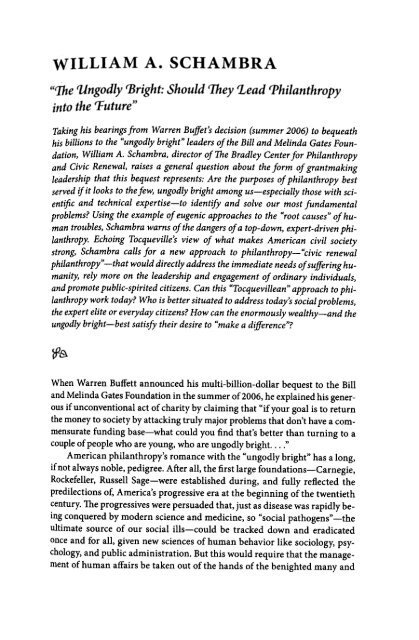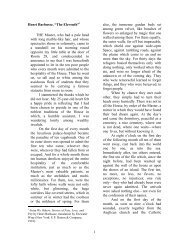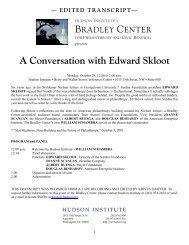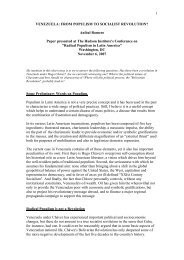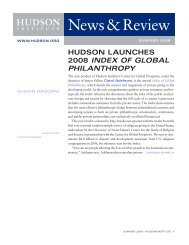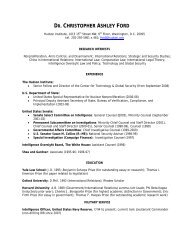ESSAY: The Ungodly Bright: Should They Lead ... - Hudson Institute
ESSAY: The Ungodly Bright: Should They Lead ... - Hudson Institute
ESSAY: The Ungodly Bright: Should They Lead ... - Hudson Institute
You also want an ePaper? Increase the reach of your titles
YUMPU automatically turns print PDFs into web optimized ePapers that Google loves.
WILLIAM<br />
A. SCHAMBRA<br />
"%e <strong>Ungodly</strong> '<strong>Bright</strong>: <strong>Should</strong> %ey '<strong>Lead</strong> Philanthropy<br />
into the 'Future"<br />
Taking his bearings from Warren Buffet's decision (summer 2006) to bequeath<br />
his billions to the "ungodly bright" leaders of the Bill and Melinda Gates Foundation,<br />
William A. Schambra, director of <strong>The</strong> Bradley Center for Philanthropy<br />
and Civic Renewal, raises a general question about the form of grantmaking<br />
leadership that this bequest represents: Are the purposes of philanthropy best<br />
served if it looks to the few, ungodly bright among us-especially those with scientific<br />
and technical expertise-to identify and solve our most fundamentalproblems?<br />
Using the example of eugenic approaches to the "root causes" of human<br />
troubles, Schambra warns of the dangers of a top-down, expert-driven philanthropy.<br />
Echoing Tocqueville's view of what makes American civil society<br />
strong, Schambra calls for a new approach to philanthropy-"civic renewalphilanthropy"-tha<br />
would directly address the immediate needs of suffering humanity,<br />
rely more on the leadership and engagement of ordinary individuals,<br />
and promote public-spirited citizens. Can this "Tocquevillean" approach to philanthropy<br />
work today? Who is better situated to address today's social problems,<br />
the expert elite or everyday citizens? How can the enormously wealthy-and the<br />
ungodly bright-best satisfy their desire to "make a difference"?<br />
~<br />
When Warren Buffett announced his multi-billion-dollar bequesto the Bill<br />
and Melinda Gates Foundation in the summer of2006, he explained his generous<br />
if unconventional act of charity by claiming that" if your goal is to return<br />
the money to society by attacking truly major problems that don't have a commensurate<br />
funding base-what could you find that's better than turning to a<br />
couple of people who are young, who are ungodly bright. ..."<br />
American philanthropy's romance with the "ungodly bright" has a long,<br />
ifnot always noble, pedigree. After all, the first large foundations-Carnegie,<br />
Rockefeller, Russell Sage-were established during, and fully reflected the<br />
predilections of, America's progressive era at the beginning of the twentieth<br />
century. <strong>The</strong> progressives were persuaded that, just as disease was rapidly being<br />
conquered by modern science and medicine, so "social pathogens"-the<br />
ultimate source of our social ills-could be tracked down and eradicated<br />
once and for all, given new sciences of human behavior like sociology, psychology,<br />
and public administration. But this would require that the management<br />
of human affairs be taken out of the hands of the benighted many and
472<br />
Philanthropic <strong>Lead</strong>ership<br />
put into the care of the enlightened few, trained and credentialed in the new<br />
social sciences. Not coincidentally, this was precisely the direction history itself<br />
wished to take. As their name suggests, progressives were convinced that<br />
history was the story of inexorable progress from the selfish individualism<br />
and parochial localism of the past to a new era of social-minded brotherhood.<br />
But only the ungodly bright avant garde had the historical and scientific<br />
insight to break with the parochial allegiances of the past, and persuade<br />
or compel the many to follow them into a more promising, socially conscious,<br />
collective future.<br />
<strong>The</strong> first large foundations eagerly bought into progressivism's view that<br />
new, professionally trained elites were trailblazers into a brighter future. And<br />
so they invested massively in the rationalization, standardization, and modernization<br />
of old professions like law, education, and medicine. To bring a new<br />
order and discipline to public affairs, they also funded the development of new<br />
professions like social work and public administration. <strong>The</strong>se updated old and<br />
new professions would find their home in the modern research universityanother<br />
favorite funding target for Carnegie and Rockefeller-where genuinely<br />
objective research could be conducted free from the distorting pressures<br />
of politics and markets, and where the next generation of elites would be<br />
trained.<br />
Even the way these foundations organized themselves-existing in perpetuity,<br />
with highly abstract statements of purpose-reflected an abiding faith in<br />
the progressive accumulation of intelligence in the hands of the few. As longtime<br />
Rockefeller Foundation president Raymond Fosdick noted, only openended,<br />
perpetual giving was able to accommodate the optimistic conviction<br />
that "the dead hand should be removed from charitable bequests," leaving<br />
grantmaking decisions entirely "in the hands of living men," because "the wisdom<br />
of living men will always exceed the wisdom of any man, however wise,<br />
who has long since been dead."<br />
This overarching faith in the new sciences of society lies behind one of the<br />
most frequently repeated justifications for modern philanthropy, uttered first<br />
by John D. Rockefeller himself: "<strong>The</strong> best philanthropy is constantly in search<br />
for finalities-a search for cause, an attempt to cure the evils at their source."<br />
<strong>The</strong> old, discredited approach of charity, in this view, responded too emotionally<br />
and directly to the immediate problems of individuals before them. It did<br />
not use its head. It lacked the steely, detached scientific knowledge to see<br />
through the bewildering, distracting, superficial manifestations of social ailments,<br />
down to the final, root causes of those ailments, which we now had the<br />
power to cure once and for all.<br />
But only the ungodly bright few are able properly to exercise scientific discipline.<br />
Quoting Oliver Wendell Holmes, Fosdick made this link explicit: "If<br />
notwithstanding the apparent confusion and welter of our life, we are able to<br />
find a steadiness of purpose and quiet dominating intelligence, it is largely<br />
I
Schambra, "<strong>The</strong> <strong>Ungodly</strong> <strong>Bright</strong>" 473<br />
because of [those] who have been trained to a considerable extent in the scientific<br />
method."<br />
It might seem today that we no longer look to social science with such na-<br />
Ive, utopian expectations. Nevertheless, the language and practice of modern<br />
American philanthropy still reflect an abiding faith in the ungodly bright to<br />
lead us into a new, more rational world. As recently as 2006, the new president<br />
of the Rockefeller Foundation took office with an unabashed reaffirmation of<br />
the vision of 1910: "<strong>The</strong> focus of this wonderful foundation on the root causes<br />
of social ills is very powerful and very compelling."<br />
Hence, foundations invariably describe themselves as innovators and experimenters,<br />
relentlessly pursuing "social change" through new and imaginative<br />
projects that will conclusively reveal the hidden workings of underlying<br />
social forces. <strong>The</strong>ir programs are designed according to cutting edge academic<br />
theories about social behavior and carried out by staff with impressive professional<br />
credentials. Foundations know that they are tapping into root causes because<br />
their programs produce concrete outcomes analyzable by sophisticated<br />
scientific metrics. Philanthropy is peculiarly positioned to play this pioneering<br />
role in social change, it is often argued, because it is mercifully insulated from<br />
market forces, political demands, and other bothersome pressures of the everyday<br />
world, and so can come at public problems from a uniquely objective, detached<br />
point of view. In other words, foundations still provide a perch from<br />
which the ungodly bright can steer social change in a progressive direction.<br />
It is hardly surprising, then, that Warren Buffett should have surveyed the<br />
perplexing variety of charitable needs and projects clamoring for his attention,<br />
and concluded that it was better to "attack truly major problems" by turning<br />
his fortune over to the intelligent few. For all the changes the twentieth century<br />
wrought, its philanthropy closed the century as it began, with leadership<br />
by the ungodly bright still regarded as the only progressive and enlightened<br />
path for grantmaking.<br />
After a full century of insisting that their peculiar value to society is the<br />
ability to get to root causes of, and decisively solve, social problems, how have<br />
foundations performed? For a field so insistent that its grantees show demonstrable<br />
out
474 Philanthropic <strong>Lead</strong>ership<br />
~<br />
one, and rearranging existing services into new combinations. That may be<br />
commendable work, but it's hardly how philanthropy justifies itself. It claims<br />
rather that the ungodly bright deserve the privileged position of grantmaking<br />
leadership because they don't tinker, but rather cut directly to the source of<br />
significant social problems, grasp their cause, and solve them once and for<br />
all-just as hookworm was decisively eradicated in large parts of the South.<br />
And this is precisely where philanthropy has such a feeble record. It would be<br />
difficult, if not impossible, to name a single social problem-even an insignificant<br />
one-the roots of which philanthropy has laid bare and solved.<br />
Even worse, philanthropy has on at least one occasion followed what<br />
looked like a root cause in a particularly monstrous direction. Early in the<br />
twentieth century, the new science of eugenics recommended itself to Andrew<br />
Carnegie, John D. Rockefeller, and his son "Junior," precisely because it appealed<br />
to their "root causes" aspirations. Just as tracking physiological diseases<br />
back to germs had begun to eliminate root causes of medical ailments, so<br />
tracking social pathology-crime, pauperism, dypsomania, and moral laxityback<br />
to defective genes would allow us to attack it at its roots. Indeed, suggested<br />
prominent progressive scholar Charles Van Hise, "We know enough<br />
about eugenics so that if the knowledge were applied, the defective classes would<br />
disappear within a generation:' <strong>The</strong>y would disappear because the eugenicists<br />
had set out to persuade the state to confine and sterilize the unfit. As Junior<br />
noted, this was the only "scientific way of escape from the evils" to which bad<br />
genes gave rise.<br />
From the perspective of philanthropic eugenics, the old practice of<br />
charity-that is, simply alleviating human suffering-was not only inefficient, it<br />
was downright harmful. As birth control heroine Margaret Sanger (another<br />
Rockefeller grantee) put it, -America's charitable institutions are the "surest<br />
signs that our civilization has bred, is breeding, and is perpetuating constantly<br />
increasing numbers of defectives, delinquents, and dependents."<br />
Efforts to develop and apply eugenics to eliminate the defective classes<br />
were undertaken with Rockefeller and Carnegie support at the Eugenics Record<br />
Office at New York's Cold Spring Harbor. Rockefeller funds would also go<br />
toward research institutions in Germany that were seeking ways to discourage<br />
the propagation of inferior individuals and races, drawing their inspiration<br />
from the techniques proving themselves in the United States. By the time Cold<br />
Spring Harbor's eugenics program ended in the late '30s, tens of thousands of<br />
" defectives" in America had been institutionalized or sterilized, and the ground<br />
had been laid for the most unspeakable horrors of the twentieth century.<br />
It might be possible to dismiss the eugenics episode as a wrong turn on the<br />
road to progress, as indeed, it is treated in the few histories that mention it at<br />
all. But it is also possible to look at eugenics as illustrative of the central danger<br />
posed by commissioning the ungodly bright to drive relentlessly to the root
.,.<br />
Schambra, "<strong>The</strong> <strong>Ungodly</strong> <strong>Bright</strong>" 475<br />
causes of social problems. Modern philanthropy asks our foundation elitesalready<br />
well insulated from the rest of us by credentialed expertise, professional<br />
detachment, and privileged tax status-to look past or to deliberately<br />
ignore the immediate and diverse needs of those immediately in front of<br />
them. Those needs are, after all, mere symptoms, attention to which was the<br />
old, discredited approach of charity.<br />
But once the ungodly bright steel themselves sufficiently to see sufferers<br />
not as unique individuals, but rather as insubstantial manifestations of underlying<br />
pathologies, it becomes easy to pursue solutions that at first ignore,<br />
and finally violate, innate human dignity. Indeed, the bright may well conclude<br />
that the most merciful way to alleviate suffering is to prevent anyone<br />
from becoming a sufferer in the first place-by cutting off suffering at its genuine<br />
root. <strong>The</strong>y become vulnerable to British socialist Havelock Ellis's view,<br />
that "the superficially sympathetic man flings a coin to the beggar; the more<br />
deeply sympathetic man builds an almshouse for him; but perhaps the most<br />
radically sympathetic of all is the man who arranges that the beggar shall<br />
not be born."<br />
Today, of course, our knowledge of the human genome and our growing<br />
capacity to manipulate it at will present us unparalleled opportunities to see to<br />
it that beggars-or "undesirables" of any sort-shall not be born. <strong>The</strong> fact that<br />
we are now able to do so without resort to the crude, messy eugenics of sterilization<br />
makes it all the more tempting to view this as a purely scientific act of<br />
"radical sympathy." As late as 1952, Raymond Fosdick would praise Rockefeller's<br />
iQ.vestments in its natural sciences program as a way to "develop so sound<br />
and extensive a genetics that we can hope to breed in the future superior men."<br />
That temptation is compounded by the fact that the eugenics episode has been<br />
airbrushed entirely from the relentlessly upbeat historical account of American<br />
philanthropy. At the precise moment when we need more than ever to<br />
grapple with the subtle moral pitfalls of genetics-driven, root-causes philanthropy,<br />
we are too embarrassed or too ashamed even to acknowledge that we<br />
have faced and failed the test before.<br />
Whether the philanthropy of the ungodly bright takes a monstrous turn,<br />
or-as it has for over a century-merely conceals its futility with lofty rhetoric,<br />
it would be Iotseful today to rethink philanthropy, given the likely arrival of<br />
considerable ambunts of philanthropic dollars as wealth passes from one generation<br />
to the next.<br />
What might a new approach to philanthropy look like? It would start by<br />
challenging the central premise of twentieth-century philanthropy that the<br />
ungodly bright are somehow better equipped to solve society's problems than<br />
are everyday citizens. <strong>The</strong> notion that citizens themselves could and should<br />
playa central role in solving their own problems is, of course, reflected in Alexis<br />
de Tocqueville's understanding of American democracy. <strong>The</strong> great danger of
476 Philanthropic <strong>Lead</strong>ership<br />
the new age of democracy, in his view, was that citizens would become too absorbed<br />
with narrow, materialistic pursuits to pay attention to public affairs,<br />
and would be willing to turn over their affairs to management by bright, benevolent<br />
elites. That might result in a smoothly operating and efficient social<br />
service delivery system. But it would also mean an ominous concentration of<br />
power in a few hands, as well as a gradual impoverishment of the spirit or soul<br />
of the democratic citizen, as he lost the capacity or the desire to engage withand<br />
to be enlarged by-vigorous encounters with other citizens of differing<br />
backgrounds and opinions.<br />
Curiously, American foundations today frequently fund studies and conferences<br />
anxiously pondering precisely this problem of citizen disengagement<br />
and the decline of the democratic spirit in America. But they seldom look critically<br />
at their own practices, to consider whether their clear preference for public<br />
management by the ungodly bright might not in itself convey a dispiriting<br />
message to democratic citizens, and feed the cycle of disengagement.<br />
How might it be otherwise? Tocqueville suggested that Americans had<br />
avoided the central problem of democracy by leaving considerable authority to<br />
solve problems in the hands of small, local, decentralized institutions and voluntary<br />
associations of all sorts, within which citizens would be expected to<br />
thrash out their differences and come up with their own, albeit often roughand-ready,<br />
solutions to their problems. This is more than seeking "feedback"<br />
from citizens about programs designed for them by others. It is, rather, genuine<br />
self-government, with final decisions left to citizens themselves.<br />
Perhaps foundations wishing to pursue an alternative to leadership by the<br />
ungodly bright could build their giving instead squarely on Tocqueville's insight.<br />
<strong>The</strong>y could redirect funding to programs that originate with the views of<br />
citizens at the grassroots, with their understanding of the problems they face,<br />
and how they wish to go about addressing them. Solutions tailored by citizens<br />
who actually live with the problems are more likely to be effective for their<br />
own neighborhoods. Community ownership insures that these approaches<br />
will be supported and sustained over the long haul, rather than provoking the<br />
sort of resistance that often greets programs designed by remote experts and<br />
"parachuted" into neighborhoods. Perhaps most important, the process of formulating<br />
and proposing solutions to their own problems cultivates in citizens<br />
the skills essential to democratic self-governance-the ability at first to endure,<br />
but finally perhaps to relish, the messy, gritty process of deliberating, arguing,<br />
and compromising demanded by American democracy's conviction<br />
that all citizens are to be treated with dignity and respect. This is at some remove,<br />
indeed, from Warren Buffett's preference for a kind of philanthropy that<br />
would insulate him from being "too involved with a lot of people I wouldn't<br />
want to be involved with and [having] to listen to more opinions than I would<br />
enjoy."
Schambra, "<strong>The</strong> <strong>Ungodly</strong> <strong>Bright</strong>" 477<br />
Tocquevillian or civic renewal philanthropy would reach out quietly but<br />
actively into the communities it wishes to assist, harvesting "street wisdom"<br />
about which groups genuinely capture a community's self-understanding of its<br />
problems. Such groups will more than likely have duct tape on their industrial<br />
carpeting and water stains on their ceilings. <strong>The</strong>y will not be able to draft<br />
clever, eye-catching fundraising brochures or grant proposals. <strong>The</strong>y will not<br />
have sophisticated accounting systems, or be able to layout a schedule of measurable<br />
outcomes. <strong>The</strong>y will not speak the language of the social sciences, but<br />
more often than not, the language of sin and spiritual redemption. <strong>The</strong>y will<br />
not be staffed by well-paid credentialed experts, but rather by volunteers whose<br />
chief credential is that they themselves have managed to overcome the problem<br />
they are now helping others to confront. No matter what the group's formal<br />
charter states, it will minister to whatever needs present themselves at<br />
the door, even if it means being accused of inefficiency or mission drift. For<br />
each person is treated not as an inadequately self-aware bundle of pathologies,<br />
but rather as a unique individual, a citizen possessed of a soul, demanding a<br />
respectful, humane response to the entire person.<br />
This approach turns completely on its head the still-entrenched orthodoxy<br />
of progressive philanthropy. Indeed, it looks suspiciously like charity-the antiquated,<br />
discredited approach which nonetheless honored and ministered personally<br />
to the individual before it. Charity does indeed deal with "mere<br />
symptoms" because they are what people themselves consider important, rather<br />
than with root causes visible only to experts who can "see through" the client.<br />
Because civic renewal philanthropy tackles social problems individual by individual,<br />
neighborhood by neighborhood, and because it relies on and entrusts<br />
ordinary, public-spirited citizens, familiar with the communities of which they<br />
are a part, to lead the way-to identify and resolve their own problems in their<br />
own way-this approach will not appeal to the ungodly bright.<br />
It is hardly surprising that the immensely wealthy today should find appealing<br />
the century-old vision of putting massive funding into cutting-edge<br />
technology in order to deliver the decisive, "knock-out punch" to some vexing<br />
social problem. Perhaps a handful, however, will come to appreciate the lesson<br />
of the past century, that there are no knock-outs in the effort to improve society,<br />
and the seari::h for them can readily take ugly turns. By funding more concrete,<br />
immediate, community-based efforts of the sort described by Tocqueville, however,<br />
it would be possible to make modest headway against social ills. It would<br />
also contribute to a much loftier purpose, the revival of civic engagement and<br />
democratic self-governance in America, perhaps thereby helping to insure the<br />
survival of our democratic republic. But to appreciate the importance of that<br />
goal, it is necessary to transcend the narrow, scientific knowledge of the ungodly<br />
bright. It requires instead a kind of prudence or wisdom that aims at an<br />
attainable good, while accepting and working with, rather than trying to see
478<br />
Philanthropic <strong>Lead</strong>ership<br />
through, the bewildering variety of human needs. It thus fully respects and<br />
helps to preserve democratic citizenship and human dignity. This would be the<br />
philanthropy, not of the ungodly bright, but rather of the godly wise.<br />
Written in response to the Dialogues on Civic Philanthropy, "Philanthropic <strong>Lead</strong>ership"<br />
(November 8, 2005). By permission of the author.


